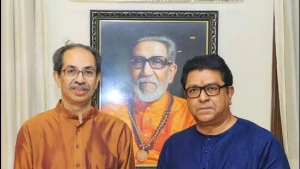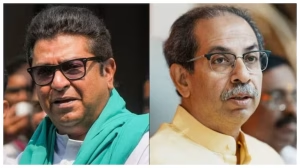The political landscape of Maharashtra has witnessed a seismic shift as the UBT-MNS alliance has been officially confirmed for the upcoming local elections. This groundbreaking partnership between the Shiv Sena (UBT), led by Uddhav Thackeray, and the Maharashtra Navnirman Sena (MNS), headed by Raj Thackeray, marks the end of nearly two decades of political estrangement between the cousins. The alliance discussions have been ongoing with multiple rounds of meetings between leaders of both parties, particularly focusing on the upcoming municipal corporation elections.
The UBT-MNS alliance represents more than just electoral convenience; it symbolises the reunification of the original Shiv Sena ideology under a common banner. After 20 years, Raj and Uddhav Thackeray sharing the same platform has sparked widespread alliance discussions, particularly as both parties recognise the need to consolidate Marathi votes against the Bharatiya Janata Party’s growing influence in urban Maharashtra.
This strategic partnership addresses the fragmentation that has historically benefited the BJP in key municipal corporations. The UBT-MNS alliance aims to present a unified front that can effectively challenge the saffron party’s dominance in Maharashtra’s urban centres, where both parties have significant but divided support bases.
 Mumbai: UBT-MNS Alliance
Mumbai: UBT-MNS Alliance
Mumbai remains the most significant battleground for the UBT-MNS alliance. The Brihanmumbai Municipal Corporation (BMC) elections hold particular importance as both parties have a historically strong presence in different constituencies across the city. There is mounting public pressure on the Thackeray brothers to contest the BrihanMumbai Municipal Corporation elections together, reflecting the grassroots demand for this political reunification.
The alliance strategy in Mumbai focuses on combining UBT’s traditional strongholds in central Mumbai with MNS’s influence in the western suburbs, creating a formidable electoral machine capable of reclaiming the civic body from BJP control.
The UBT-MNS alliance extends its strategic reach to Pune and Nashik, two of Maharashtra’s most important industrial cities. In Pune, where both parties have contested separately in previous elections, the alliance offers an opportunity to consolidate anti-BJP votes and present a credible alternative to the ruling party’s development narrative.
Nashik, being Uddhav Thackeray’s home district and having a significant MNS presence, becomes a crucial testing ground for the UBT-MNS alliance. The partnership here could serve as a model for similar collaborations across other parts of Maharashtra.
The Mumbai Metropolitan Region expansion cities of Thane and Kalyan-Dombivli represent critical constituencies for the UBT-MNS alliance. These rapidly growing urban centres have witnessed significant demographic changes, making them battlegrounds for competing political narratives about development, infrastructure, and cultural identity.
The UBT-MNS alliance builds upon shared ideological foundations despite years of political separation. Both parties advocate for Marathi pride, son-of-the-soil politics, and strong regional identity. The original split in 2006 was due to ideological clashes between Raj Thackeray and his cousin Uddhav Thackeray, but current political realities have necessitated a pragmatic approach to opposition unity.
This convergence extends beyond mere electoral calculations. The UBT-MNS alliance represents a philosophical reunion of the original Shiv Sena vision, combining Uddhav’s inclusive approach with Raj’s aggressive regionalism to create a comprehensive political alternative.
 Also, for further information, please read about: the Shiv Sena UBT Massive Upheaval
Also, for further information, please read about: the Shiv Sena UBT Massive Upheaval
The UBT-MNS alliance fundamentally alters the electoral mathematics in Maharashtra’s urban constituencies. Historical voting patterns show that the division of Marathi votes between UBT and MNS has often resulted in BJP victories despite the combined opposition vote share exceeding that of the ruling party.
By forming this alliance, both parties aim to maximise their collective vote share while minimising wastage due to competition. The strategy involves careful constituency-wise seat sharing that leverages each party’s strengths while avoiding confrontation in areas where both have significant presence.
The formation of the UBT-MNS alliance has prompted significant responses from opposition parties, particularly the BJP and its allies. The ruling party faces the prospect of confronting a unified Marathi front that could potentially mobilise regional sentiment against perceived external domination.
However, the UBT-MNS alliance also faces internal challenges. Reconciling cadre at the grassroots level, managing conflicting local leadership ambitions, and maintaining ideological coherence while accommodating diverse viewpoints within the alliance structure require careful political management.
The UBT-MNS alliance could trigger broader political realignments across Maharashtra. Success in local elections might encourage similar partnerships in state and national elections, potentially altering the state’s political landscape for years to come.
This alliance also sets a precedent for opposition unity in other states where regional parties face challenges from national parties. The UBT-MNS alliance demonstrates that ideological differences can be set aside when faced with common political challenges and shared objectives.
The confirmation of the UBT-MNS alliance marks a watershed moment in Maharashtra politics. This partnership between Uddhav and Raj Thackeray represents both a personal reconciliation and a strategic political realignment that could reshape the state’s electoral dynamics. As municipal elections approach in Mumbai, Pune, Nashik, Thane, Kalyan-Dombivli, and other key cities, the alliance’s ability to translate unity into electoral success will determine not just the immediate political landscape but also the future trajectory of regional politics in Maharashtra. The UBT-MNS alliance stands as a testament to the enduring power of political pragmatism and the potential for ideological convergence when faced with common challenges.

